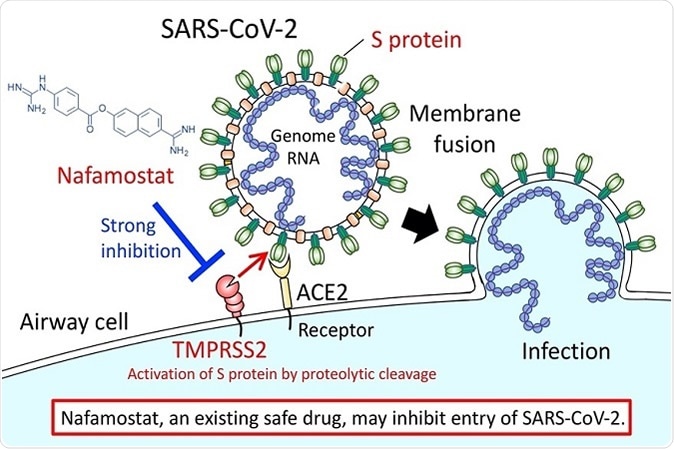With the increasing number of infections across the globe, scientists have resorted to studying existing drugs in the hope of discovering a cure for the coronavirus disease (COVID-19). A team of researchers has found that an existing drug, Nafamostat or Fusan, a drug used to treat acute pancreatitis, may effectively block the process used by the novel coronavirus to spread and cause illness.
The severe acute respiratory syndrome coronavirus 2 (SARS-CoV-2) has wreaked havoc across 180 countries, affecting more than 860,000 people and killing more than 42,000. As the pandemic spreads further, scientists are scrambling to find existing and new vaccines and drugs that can help prevent SARS-CoV-2 infection and to treat COVID-19 disease.
According to the new research by scientists at the University of Tokyo, Nafamoslat mesylate can prevent fusion of the virus envelope with the surface membranes of the host cell, which is the first and crucial step in infection.
Nafamostat mesylate, a synthetic serine protease inhibitor, is a short-acting anticoagulant, which also has some antiviral and anti-cancer properties. It has been used in trials studying the prevention of Liver Transplantation and Postreperfusion Syndrome. The use of nafamostat in Asian countries is approved as an anticoagulant therapy for patients undergoing continuous renal replacement therapy due to acute kidney injury.

Nafamostat, an existing safe drug, may inhibit entry of SARS-CoV-2. Image Credit: The University of Tokyo.
Inhibits membrane fusion
The coronavirus, SARS-CoV-2, can be transmitted to another person through droplets when a person sneezes or coughs. Viruses are packets of nucleic acid, and it can be RNA or DNA, which are surrounded by an envelope or a protein shell. Sometimes, it is protected by fatty materials called lipids. When viruses are outside a living cell, it is a dormant particle or a nonliving entity. However, once it enters a host, it can have all the raw materials for reproduction.
When SARS-CoV-2 enters a host cell, it becomes alive, hijacking the cell's metabolic machinery to reproduce copies of itself. It then triggers an infection. The genome RNA of coronaviruses, including SARS-CoV-2, SARS-CoV, and MERS-CoV, are covered and surrounded by an envelop containing a lipid bilayer and envelope proteins. The S protein, which is a spike in the envelope, attaches or binds to a cell membrane receptor, the angiotensin-converting enzyme 2, resulting in membrane fusion.
In the case of Nagamostat, it can inhibit the membrane fusion at a concentration less than one-tenth that of Camostat mesylate, which is a drug identified by German scientists as another potential inhibitor of COVID-19. These drugs were both developed and manufactured in Japan to treat acute pancreatitis, or the inflammation of the pancreas, and other diseases. For years, doctors in the country had been using these, with adequate data that they are safe to use.
Drug repurposing
Drug repurposing had been an action performed by many scientists and institutions worldwide. Scientists have studied many possible substances and drugs that can combat COVID-19 since it would be faster given the urgency of the situation.
"Considering that SARS-CoV-2 infection is already spreading worldwide, drug repurposing, which searches for therapeutics among existing drugs with established safety records, seems to be extremely worthwhile," Professor Jun-ichiro Inoue from the Research Center for Asian Infectious Diseases of the Institute of Medical Science, the University of Tokyo said.
Nafamostat can be given through intravenous infusion and can be used to prevent membrane fusion through the SARS-CoV S protein. The study suggests that the drug will prevent SARS-CoV-2 from entering human cells, inhibiting infection. Nafamostat can be used alone, or in combination with other drugs like antivirals to fight COVID-19.
The study is published in the journal Cell.
COVID-19 situation
The coronavirus that causes COVID-19, SARS-CoV-2, has been ravaging through the world, with 180 affected countries. Dubbed as a global pandemic by the World Health Organization (WHO), the infection has taken a toll on many countries, locked down cities, and negatively impacted the economy.
With the high number of infections happening, many front-liners and health workers are dying while some are overworked due to the influx of patients infected with the virus. The United States now has the highest number of infections, with 189,624 confirmed cases, followed by Italy and Spain, with 105,792 and 95,923 infections, respectively.
Source:
The University of Tokyo. (2020). Identification of an existing Japanese pancreatitis drug, Nafamostat, which is expected to prevent the transmission of new coronavirus infection (COVID-19). https://www.ims.u-tokyo.ac.jp/imsut/en/about/press/page_00002.html
Journal reference:
Hoffman, M., Kleine-Weber, H., Schroeder, S., Muller, M., Drosten, C., Pohlmann, S. et al. (2020). SARS-CoV-2 Cell Entry Depends on ACE2 and TMPRSS2 and Is Blocked by a Clinically Proven Protease Inhibitor. Cell. https://www.cell.com/cell/fulltext/S0092-8674(20)30229-4?_returnURL=https%3A%2F%2Flinkinghub.elsevier.com%2Fretrieve%2Fpii%2FS0092867420302294%3Fshowall%3Dtrue